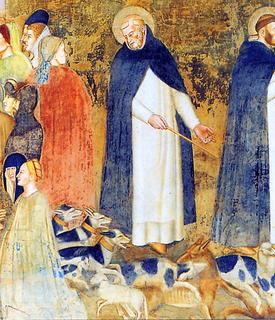 St Dominic and his Dominicans. The Dominicans (Dominicanes) were often referred to as "the hounds of the Lord" (domini canes), a pun that reflected their mission as the guardians of the faithful against the fox of heresy. Dig the fact that the dogs have markings that mimic the Dominican habit.
St Dominic and his Dominicans. The Dominicans (Dominicanes) were often referred to as "the hounds of the Lord" (domini canes), a pun that reflected their mission as the guardians of the faithful against the fox of heresy. Dig the fact that the dogs have markings that mimic the Dominican habit.It's about time I wrote something. August laziness has taken over me and I find it hard to apply myself, but one must not let the blog wither. For awhile I have wanted to address the op-ed that Cardinal Christoph Schonborn wrote for the New York Times on evolution (you can pay the Times to read it or you can read about the article and reactions to it here). The Cardinal seems concerned that accepting the scientific consensus on the subject of evolution would also require the acceptance of a Godless random universe. Of course this is one cardinal's opinion, however close he may be to the pope, and not the opinion of the Church as a whole. It is very far from doctrine. The Vatican astronomer has objected publicly, as have other Catholic scientists. Still Schonborn's opinion is disturbing, because the modern Catholic Church has done well at reconciling science and faith, and a breakdown of that reconciliation in a society that is both technological and religious can create a dangerous cognitive dissonance. This certainly has happened in the United States. The scientist, using his or her method, cannot and should not seek out the hand of God. That can only be done through faith and revelation. The scientist reveals the complexity and beauty of Creation, the believer sees the providence behind that.
Another aspect of this issue is more disturbing. Why did the Austrian Cardinal publish his article in the American New York Times? In a country where the issue of evolution is political dynamite and even the president suggests the teaching of "intelligent design" theory is a reasonable thing to do, one can not step into the public forum and criticize accepted scientific theory without situating oneself in distinct political and religious camps: politically, the far right; and religiously, fundamentalism. The latter group especially is a very odd bedfellow. Conservative Catholics, both in the Curia and here in the US, see the religious right as a great tool to advance their specific goals on abortion, stem-cell research and gay marriage (forgetting always the death penalty, war, and social justice). But I wonder if someone like William Donohue of the Catholic League realizes that when he got off the stage at the mega-church for "Justice Sundays," most of the people in the room were certain he was going to hell. Ecumenical understanding has been successful with mainline Protestant demoninations and we should work to further this understanding. But I suspect these right wing groups are more interested in power than they are in Christian unity.
Whatever the fundamentalists are trying to do, it's disturbing to see conservative elements in the Catholic Church push the Church to one extreme in the cultural divide that is tearing this country in half and producing a fundamentalism that is pathologically anti-intellectual (to the point of creating a hostility to science that is difficult to sanely maintain in an industrially developed society), politically apocalyptic (support in many fundamentalist circles for more hardline sectors in Israeli politics has much to do with the hope of provoking Armageddon), and manifestly intolerant of any other views than their own. Even those Catholics who support the entire conservative Catholic agenda -- and many of us do not -- should be concerned at the cost to their integrity that falling into an extremist camp would entail.
PS: Since I posted the above, I have come across a good article on this subject from Commonweal Magazine.

No comments:
Post a Comment